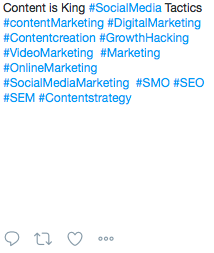The rise and fall of #contentstrategy
Content strategy—or should I say, #contentstrategy—has been picking up steam over the years on social media. Twitter is especially saturated with the #contentstrategy tag. But what exactly is being positioned as content strategy?
About 20 years ago, content strategy emerged as a term for the planning, development, management, and governance of content. The emphasis was on the strategy half of the term, grounded in achieving specific business goals or solving specific business problems.

Can you spot the #contentstrategy?
Today, the term’s meaning is diluted. Often you will see content strategy being positioned side by side with terms about content marketing, copywriting, and user experience.
That’s not to say that these practices have nothing to do with content strategy. They can (and should) overlap, feed into, or employ a content strategy. But the lines are becoming blurred, mainly from conflation on social media.

This is not a #contentstrategy. But if it fails, it’s a great example of the definition of insanity.
Much of what we see on Twitter are tactics. And tactics are fine. You can’t execute a strategy without them. But they are not themselves strategies. Kristina Halvorson has a great presentation on this topic:
As for Scriptorium, we continue to use content strategy to solve very real (and often very big) business problems. Our belief is that a content strategy envelops many content initiatives and is tied directly to the core strategies and goals of the business.
Lumping content strategy in with copywriting, marketing and promotional tactics, and the like damages its meaning, focus, and intent.
Have you noticed this conflation of the term? Do you think it’s a problem?



techwriterkai
I agree, yet at the same time, there’s little you can do once the genie of a misused term or definition is out of the bottle once too many people use it.
See the word “curate”, the mis-use of which drives many conscentious art historians nuts. Or “deconstruct” for literary scholars. Or “quantum leap” for physicists.
56 years, William Burroughs wrote about language as a virus. Which is the best shortcut explanation I can think of.
Larry Kunz
After reading Sarah’s “single-sourcing is dead” post and then seeing your “fall of #contentstrategy” hed, I thought that I’d stumbled into Heresy Month at Scriptorium.
However, I think you’re right. The term #contentstrategy has been dragged into places where it has no business going. I think it’s because — despite the best efforts of people like Kristina Halvorson (and you folks at Scriptorium, of course) — people think they know content and jump to the conclusion that content strategy encompasses almost everything that has to do with content. At the risk of sounding smug, perhaps it’s only the people who deal seriously in content, the ones who are left to clean up the mess when companies are reckless with their content, who really understand what content strategy is all about.
Bill Swallow
Heresy Month… I like it!
I don’t think it’s about seriousness. Maybe scope and granularity…
But it’s more the social promotion that’s diluting the meaning. People are running with a million and one definitions. And I wouldn’t be terribly bothered by it (even given how weird a search feed it’s become) but now the job title Content Strategist could mean anything from “writer of copy” to “solver of really hairy business problems involving content.”
Mark Baker
It always seemed to me that “content strategy” was a misbegotten term. The word strategy gets use in two ways. One deals with objectives: growth strategy. The other deals with processes: a strategy for reducing production defects. But “content strategy” falls between two stools here.
As a term for achieving specific business goals or solving specific business problems it does not really work because content is not a business goal. Business goals are things like increasing margins or improving market share. Content is one of the tools you can use to achieve those goals, but it is never the only tool used. Strategic direction in these efforts is never going to be given to a content person. So while content may be important to these strategies, they are not content strategies.
On the other hand, a strategy for managing content is all about content processes. This is what the term has largely come to mean. This makes sense because the advent of the web has meant that there has been a centralization of content delivery on the company website which naturally required a degree of coordination that did not exist before. Want to call that content strategy? Most organizations are going to be fine with that.
But the thing that content strategy is claiming to be is neither of these things. It is a sort of hybrid, attempting to align all the contributions content makes to all the true business strategies. It is a genuine problem, since a vast body of public information does not differentiate which of the corporate strategies it is supporting of detracting from. But it seems like most people don’t get that, And I don’t think the term content strategy does anything to get that message across.
Bill Swallow
That’s an interesting perspective. Regarding content not being a business goal, I’m not sure I completely agree. While content itself isn’t a goal, it’s certainly a key business driver for most companies. And it comes with a ton of overhead. Regardless of whether the definition sits with objectives, processes, or somewhere else, it has a very real seat at the table. But if it’s the term itself that’s the problem, I’m all ears for an alternative.
Mark Baker
Exactly, content is a business driver, not a business goal, and the issue in the age of the web is that all the content you issue to support all your business goals is all out there together and the stuff created to drive one goal can interfere with the stuff created to drive another goal.
So the issue is, how do we make sure that the content we are producing to support each of our business goals is properly coordinated so that it supports all of our business goals rather than sabotaging one while supporting another.
And if that is the issue, the right name for it might be something like message arbitration, or message harmonization, or message coordination. “Message” because this is about what is said, not the means of saying it. “Arbitration” because this is about mediating trade-offs between the needs and the styles of different business units.
While it has obvious strategic implications, this activity is not a strategy in its own right. It is an arbitration between strategies, designed to make sure they don’t sabotage each other. Considering content as a strategy would give it an independence it does not warrant. Rather, the issue is about arbitration between strategies to enable them all to be successful. The servant should not become the master, but it takes a wiley servant to serve many masters well and keep them from quarreling.
Bill Swallow
I don’t think message arbitration, harmonization, or coordination are correct terms. And we may be comparing apples to oranges. Marketing is not a business goal, either, but there certainly is a very valid thing called marketing strategy. I still think “content strategy” may be the best-fit term. After all, it’s not a solitary activity, involves usually many carefully orchestrated plans working in conjunction toward a goal (which is not “content”), and involves a well-blended mix of content development, infrastructure, workflow, change management, and governance.
Mark Baker
Well, if content strategy is the best fit term, then there is no term that fits well. A term that fit well would not still be causing confusion this far down the road. And if there is no term that fits well, that should have us asking if the concept itself fits well. Terms fit well when people recognize a thing and agree to give it a name. It is actually the recognition and agreement that make the term fit, rather than the specific words in the name. So if the term does not fit, that means there is either no recognition or no agreement. Which, I guess, takes this discussion full circle.
Jessica
Relevant content is the basic criteria of any online marketing strategy. It attracts more customers to a particular niche. A perfect content strategy comprises different attributes of content which describes brand’s image publically. A successful content marketing always creates more awareness through useful sharing amongst the targeted customers.
Bill Swallow
I agree (in the marketing context). I hope you’ll agree that “10 new email marketing hacks” is not a content strategy, though. Content strategy is defined as the planning, development, management, and governance of content. I think a lot of people are running with the buzzword with zero understanding of what this term actually means, thus diluting its meaning and importance.